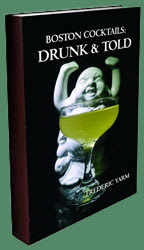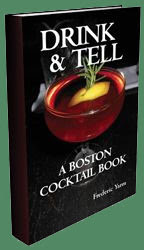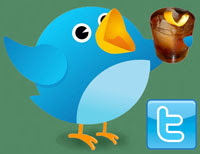 My middle talk on Friday at Tales of the Cocktail had one of the more curious titles, namely "Make Money while Breathing Fire." The name was not about breathing actual fire but how bar teams can differentiate into the greeter and the speed person/drink maker. The panelists were JJ Goodman (owner of London Cocktail Club), John Lermayer (Miami's Sweet Liberty), and Zach Patterson (West Hollywood's Melrose Umbrella Company) with moderator Adrian Biggs (Bacardi ambassador).
My middle talk on Friday at Tales of the Cocktail had one of the more curious titles, namely "Make Money while Breathing Fire." The name was not about breathing actual fire but how bar teams can differentiate into the greeter and the speed person/drink maker. The panelists were JJ Goodman (owner of London Cocktail Club), John Lermayer (Miami's Sweet Liberty), and Zach Patterson (West Hollywood's Melrose Umbrella Company) with moderator Adrian Biggs (Bacardi ambassador). The premise of the talk was that with the cocktail renaissance, there was a lot of pressure in making ice, appearances, glassware, ingredients, and cocktails perfect, but at what cost? Bars and bartenders became too elitist and the guests had to follow the rules of the house. It became a trade-off of either getting a good cocktail but having a poor vibe, or having a good vibe but having to deal with getting a beer and a shot at best. At some point, party and craft needed to cross. Unfortunately, as I wrote about in Braintending and Three Phases and elsewhere, if a guest get a good drink but a mediocre experience, they will not return. And many times a bad drink with a great experience is preferable. Zach explained it better with how one can walk into the best cocktail bar and have the best drink but still have a horrible time and not want to return. At a dive bar where they "fucked up the drinks" but you had a great time, you will probably return (and cross your fingers that the next time, you get a better drink).
Zach during his introduction discussed how people are his battery, and during interviews, he likes to ask "Do you like people?" and "What drives you? What about hosting and entertaining? And does it awaken you?" Adrian during his introduction pointed out that in 2011, none of the bars in the list of the top 50 cocktail bars that year played music; by 2016, there was a generational shift to be more fun and raucous and that was portrayed in the top 50 list that included Dead Rabbit, Attaboy, and Clumsies.
John explained that the secret at Sweet Liberty was simplifying what they were trying to accomplish. They narrowed it down to 5 things: drinks, food, atmosphere (lighting & mood), music, and service. This was supplemented by their core values of pursuit of happiness and respect every shift. For the former, it required promoting a healthy work environment; John explained that it was not the absence of sickness but bringing out his staff's best. For the latter, things start with self respect and respecting each other including the use of please and thank you. An owner or manager can get the best out of workers if they feel comfortable.
Adrian then continued on to capture the title of the talk in describing the bar team as being a combination of fire breathers and money makers or ones that provide great guest interaction and ones that make most of the drinks. A good duo will have someone say "I'm going to make 50 drinks and you go make us some money." Zach explained that the designation between the speed person and the greeter cannot be too focused; if it is not intermixed, the guests will just feel like a ticket that gets passed down the line. John explained that a fire breather is needed to get people to loosen up, for moods are contagious.
John explained some of his thoughts on team building and how it was not a family. John exclaimed, "I have a family and I love them, but I wouldn't have them work for me... [Here,] if you fuck up, you're off the team." The team itself has to make the new recruits feel comfortable; if the new guy faces an internal clique that he cannot crack, he will leave.
JJ described his opening bar concept as, "A bartender's paradise. A bar where you can dance on the table while drinking a perfect Dry Martini [while] listening to AC/DC." The concept included a consideration of how to generate repeat business which is the strongest currency a bar can have. John explained how making people feel comfortable (which Zach described as having to feel like home) with every design element having an effect on the guest. Design of the space was crucial. Moreover, in restaurants, you try to turn tables, but in the bar industry, you try to get people to stay. One way is by creating memories down to having a cool bathroom and layering their experience; design will help accomplish that. JJ reminded that the matching the neighborhood is important in design, and it is key to map out the room to figure out what every guest will see from every spot in the room. As for the bartender cockpit, figure out the proper well design, bar depth, and seat height; moreover, get a bartender to design the bar itself.
JJ later put forth the concept of a triangle of atmospherics that are essential for a party: music, temperature/heating, and lighting. If the guests are not comfortable with these three, they will probably not stay. John concurred and mentioned that the first thing that he does when walking into his bar is adjusting the lights and noting whether the music is at the right volume with the correct playlist for the night. He also highly recommended getting a lighting professional.
In terms of guest relations, the bartender has to work to raise their confidence. John proffered the idea of complimenting the guest on their choices whether it be their cocktail selection or their watch; confident people spend more money since they feel good. Also, do not "vodka shame"; JJ later suggested putting a familiar drink like a Mojito on the menu -- it makes them feel comfortable and lets them judge you on how excellently you can make it. Zach compared the bar to the kitchen in a house party. Therefore, do not just drop the menu, but treat people like they walked into your own kitchen. Both Adrian and Zach mentioned how drinks should not be comped for someone you know but for only someone you just met; Zach takes it one step further by bringing over a manager or bartender and introducing that guest to them.

 The 2017 collection of 855 drink recipes, bartender tributes, and essays on hospitality from CocktailVirgin's Frederic Yarm. Available at
The 2017 collection of 855 drink recipes, bartender tributes, and essays on hospitality from CocktailVirgin's Frederic Yarm. Available at  The 2012 collection of 505 drink recipes, techniques, and Boston bar recommendations from Frederic Yarm. Available at
The 2012 collection of 505 drink recipes, techniques, and Boston bar recommendations from Frederic Yarm. Available at 




No comments:
Post a Comment